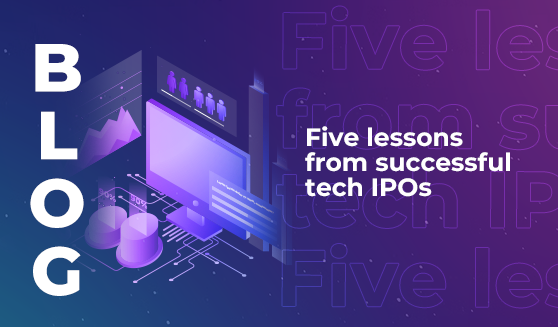
Tech careers with impact: The power of investing
If you’ve ever thought about becoming a tech investor, read this – learn why investors are the quiet force shaping the future of the industry.


According to research by Morgan Stanley, the tech IPO market is seeing a resurgence this year – with up to 15 deals expected by the end of 2024. Companies leveraging AI are particularly ripe to go public; and as large private companies experience an increase in financing needs, they’ll turn to public markets to enable liquidity.
In 2020-2021, we saw an unprecedented surge in tech IPO offerings. Things cooled off since (with a particularly dramatic drop in 2022). But now that market conditions are driving an uptick in IPO activity again, tech companies considering a public offering can look back at the successful deals that took place during that surge – and take on board the lessons that can be found there.
Going public is a significant undertaking, and any tech company considering an IPO in the future should start preparing now – even if you’re several years away from actually making the move.
Clear corporate governance, streamlined financial systems, and a strong strategic vision are essential for a successful IPO, and all of these elements take extensive development to ensure your business is ready to become a public company.
Successful tech IPOs aren’t the businesses that are scaling rapidly. Instead, they’re the ones that prioritise sustainable growth – with profitability growing too. Rapid scaling without the profits to back that growth can drive major roadblocks down the line; and investors have become more cautious of companies that demonstrate large losses, even when revenue growth is on an upward trajectory.
So tech companies with an IPO on their radar should pause and evaluate their current growth strategy. If growth is occurring at the expense of a healthy P&L sheet, you need to be able to demonstrate your path to profitability in a way that is clear and credible.
Going public requires a strong, qualified, capable leadership team. That team should be diverse and creative, with the capacity to identify problems ahead of time and adapt to market changes.
Before you take the leap, make sure you’ve surrounded yourself with people who have the experience and skills to navigate the challenges of a public offering with agility and confidence.
Before going public, a company should have a finance and accounting team packed with talent and expertise – because a public offering isn’t a simple process. Your CFO should have a comprehensive understanding of the business and market figures – because investors will look for strong articulation of your financial strategy, and detailed forecasts that take into account a wide range of market factors.
On top of that, the financial leadership team needs to have impeccable communication skills to navigate challenges when things go wrong. Will they be able to communicate effectively with investors if financial targets aren’t met?
Going public is exciting, and tech founders have a tendency to get wrapped up in that excitement and feel highly (sometimes excessively) optimistic about their prospects. It’s good to be positive – but reign it in and take care to set realistic goals and expectations, especially in communications with investors, employees, and other stakeholders.
If you set expectations too high, you risk creating disappointment, frustration, and low morale. An IPO requires a major shift in practices and requirements, and shareholders will need to adapt.
At the same time, incoming board members must approach the company with an understanding of its limitations as well as its potential. Be transparent about the resources available to your company and set expectations accordingly.
Financial discipline and comprehensive strategic planning are essential for a successful public offering. So while you’re looking to your IPO future, remember to look back at the past too – to gather lessons from the companies that have gone before you, and positioned themselves for a sustainable, profitable, and long future.

If you’ve ever thought about becoming a tech investor, read this – learn why investors are the quiet force shaping the future of the industry.

Tech generalists will enable emerging technologies to integrate across industries and societies in meaningful ways. We still need specialists – but we also need big-picture people.

Discover three tech sectors facing a talent shortage this year. Could you find your ideal role in a high-demand sector like cybersecurity, cloud computing, or artificial intelligence?

If you’ve ever thought about becoming a tech investor, read this – learn why investors are the quiet force shaping the future of the industry.

Tech generalists will enable emerging technologies to integrate across industries and societies in meaningful ways. We still need specialists – but we also need big-picture people.

Discover three tech sectors facing a talent shortage this year. Could you find your ideal role in a high-demand sector like cybersecurity, cloud computing, or artificial intelligence?